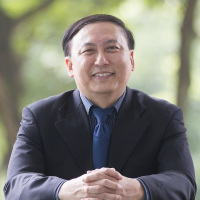Invited Speaker Ⅰ

Prof. Dong Yue
Nanjing University of Posts and Telecommunications
IEEE Fellow
Title: 新型电力系统信息物理协同主动安全控制研究
Abstract: 介绍了双碳背景下新型电力系统建设过程中存在的信息物理安全性问题,以及传统方法解决此类安全性问题存在的局限。进一步提出了亟待解决的三个关键科学问题,以及围绕上述关键科学问题解决需要研究的主要内容和相应的研究方案。
Bio: 岳东,南京邮电大学校学术委员会主任,碳中和先进技术研究院、自动化学院、人工智能学院院长;入选俄罗斯工程院外籍院士,IEEE Fellow,中国自动化学会会士,中国人工智能学会会士,教育部长江学者特聘教授。主持国家自然科学基金重大项目、重点项目、国家重点研发计划项目课题、863项目课题、住建部科学技术项目等20余项。获得IEEE Rudolf Chope科学技术奖、江苏省科学技术一等奖、中国自动化学会自然科学和发明一等奖、IEEE Transactions on Smart Grid最佳论文奖、IEEE Systems Journal最佳论文奖和 IEEE/CAA Journal of Automatica Sinica的Norbert Wiener Review奖等多项国内外奖励。担任IEEE TII共同主编、IEEE IES Fellow提名顾问委员会成员。
Invited Speaker Ⅱ

Prof. Meng Wang
Hefei University of Technology
IEEE Fellow, IAPR Fellow
Title: 基于智能交互的心理与情绪计算分析
Abstract: 对基于视觉、对话等不同强度交互方式的生理信号和微反应检测技术进行介绍,探讨其在情绪、心理和人格分析中的应用。
Bio: 汪萌,教授,博士生导师,合肥工业大学副校长,合肥综合性国家科学中心人工智能研究院副院长,安徽省人工智能协会常务副理事长。国际电气与电子工程师协会会士(IEEE Fellow)、国际模式识别协会会士(IAPR Fellow)。国家杰出青年科学基金获得者、国家重点研发计划“网络空间安全”专项项目负责人、国家重点研发计划“变革性技术关键科学问题”专项总体组专家、第八届教育部科技委信息学部委员。论文被引用三万余次,2016至2022年度连续入选科睿唯安“全球高被引科学家”。
Invited Speaker Ⅲ

Prof. Fu Xiao
Nanjing University of Posts and Telecommunications
Title: Intelligent Sensing with Ubiquitous Wireless Signals in IoT
Abstract: In recent years, with the development of the Internet of Things (IoT), various mobile and edge intelligent devices have continued to increase rapidly. Emit from these devices, many kinds of wireless signals (e.g., Wi-Fi, RFID, UWB, mmWave) are now filling our living and working spaces. These ubiquitous wireless signals have given rise to a new mode of intelligent sensing. This technology can sense the positions, vital signs and behavioral activities of human beings in a contactless and privacy-protection way, meeting the goal of efficient, convenient and pervasive sensing. This report introduces our latest progress of intelligent sensing based on ubiquitous signals, and provides new ideas for expanding intelligent sensing scenarios and promoting the implementation of sensing technology.
Bio: Dr. Fu Xiao is a professor at school of computer, Nanjing University of Posts & Telecommunications. He has long engaged in teaching and scientific research in the areas of IoT sensing and computing, data center network, etc. He has presided over more than 20 key projects, including the National Science Fund for Distinguished Young Scholars of China, The Key Program of the National Natural Science Foundation of China, National 863 Program Project, National key research and development program of China and Huawei Research Project. He has published more than 100 academic papers in high quality journals and conferences, and won the Second Prize of Science and Technology Progress of the Ministry of Education, the 15th Ministry of Education Fok Ting Tung Education Foundation Award for Young Teachers in Higher Education Institutions, the 16th Jiangsu Youth Science and Technology Award.
Invited Speaker Ⅳ

Prof. Panfeng Huang
Northwestern Polytechnical University
Title: 柔性约束多智能体协同控制及其在航空航天领域应用
Abstract: 柔性约束多智能体是具有战略性和前瞻性的先进技术方向,其在陆、海、空、天各领域都有不可估量的应用潜力。本报告介绍一类将刚性智能体通过细长、轻质、柔性系绳进行有机结合,从而构成特大尺寸、刚-柔耦合的柔性约束多智能体系统,能极大地突破单智能体系统能力局限。
本报告将首先介绍柔性约束多智能体背景需求;然后以空间飞网机器人和多无人机吊挂系统两种典型柔性约束多智能体为载体,详细介绍柔性约束多智能体系统变构型优化、运动规划、协同控制和试验验证等关键技术研究会遇到的挑战及解决思路;最后讨论可能的发展趋势及新的研究方向。通过柔性约束多智能体关键技术瓶颈的突破,将有效提升我国空间碎片主动移除、危险环境应急救援等国防和民生安全保障能力。
Bio: 黄攀峰,香港中文大学博士,西北工业大学教授,博士生导师,国家杰出青年基金获得者,国家“万人计划”科技创新领军人才,国防科技卓越青年基金获得者,国家重点研发计划项目首席科学家,现兼任国务院学位委员会第八届控制科学与工程学科评议组成员,军口某专家组副组长,科技部科技创新2030--新一代人工智能重大项目管理专家组专家,载人航天应用与服务专家组特邀专家等。曾任国家863计划重大项目专家组专家,国家重大任务副总师。主要研究方向:空间机器人技术、遥操作技术、航天器智能控制、人机混合智能控制、集群协同控制等,发表SCI论文150余篇,先后获得陕西省自然科学一等奖、军队科技进步一等奖,国防技术发明二等奖等多项科技奖励;并担任IEEE Transactions on Neural Networks and Learning Systems、《Robotica》、《自动化学报》、《宇航学报》、《航空学报(中英文版)》、《控制理论与应用》、《机器人》、《系统工程与电子技术》等期刊编委。
Invited Speaker Ⅴ

Prof. Guangchen Wang
Shandong University
Title: Pareto game of stochastic differential system with terminal state constraint
Abstract: This talk focuses on a type of Pareto game driven by stochastic differential equation with terminal state constraint. A necessary condition and a sufficient condition for Pareto efficient strategy are established. As an application of the results obtained above, a government debt stabilization problem is solved numerically.
Bio: 一直从事基于不完备信息的随机系统优化控制理论研究,取得了以倒向分离原理为特色的创新成果,在Springer出版社出版专著1部,在控制理论国际期刊SIAM J. Control Optim.、Automatica和IEEE TAC发表学术论文多篇,目前主持国家杰出青年基金项目、国家重点研发计划重点专项各1项,曾获陈翰馥奖1项,省部级科技奖3项。
Invited Speaker Ⅵ

Prof. Long Cheng
University of Chinese Academy of Sciences
Fellow of the IET
Title: 基于光电原理的可拉伸柔性传感器设计
Abstract: 柔性可拉伸传感器因具有可贴合人体测量、安全性高、适应性强的特点,在健康监测、疾病诊疗、体育训练、游戏娱乐和康复医疗等领域有广阔的应用前景。现有柔性传感器主要包括柔性应变传感器、柔性触觉传感器、柔性温度传感器等。目前,高灵敏度,高柔性,良好的稳定性对于柔性传感器而言仍是一个巨大的挑战。本报告围绕基于光电原理的柔性可拉伸传感器设计展开,主要包括可拉伸柔性应变传感器、可拉伸触觉传感器设计与制作等内容。
Bio: 程龙博士,中国科学院自动化研究所研究员,博士生导师,中国科学院大学岗位教授,IET Fellow。目前受聘IEEE SMC学会Associate Vice President for Publication, IEEE CIS Beijing Chapter主席,担任《IEEE Transactions on Cybernetics》、《IEEE Transactions on Automation Science and Engineering》、《中国科学技术科学》、《自动化学报》等国内外刊物的编委。入选国家杰出青年基金项目、北京市杰出青年基金。获得2017年度国家自然科学二等奖。程龙博士的研究兴趣包括机器人与智能控制。
Invited Speaker Ⅶ

Prof. Hesheng Wang
Shanghai Jiao Tong University
Title: 基于视觉的机器人定位导航与控制
Abstract: 本报告着眼于服务机器人两大核心功能,即移动与操作,首先对服务机器人产业与技术发展现状、所面临难点进行概述。其次介绍了团队长期攻关移动与操作中核心技术难题所取得的主要成果:针对非完整约束移动机器人复杂动力学和环境动态干扰造成的速度感知与定位失效问题,提出了融合注意力后端优化的显式遮挡计算方法,实现了复杂大场景中移动机器人视觉融合的鲁棒感知与定位;针对未标定环境导致传统定制化控制算法易失效的问题,创建了完全不依赖先验环境信息的自适应视觉伺服框架,解决了不依赖标定的机器人高精度作业难题。形成了一套实用性广的基于视觉的方法体系,提升了服务机器人关键共性技术水平。
Bio: 王贺升博士,上海交通大学特聘教授。担任自动化学会混合智能专委会副主任。现/曾担任国际期刊IEEE Transactions on Robotics,IEEE Transactions on Automation Science and Engineering, IEEE/ASME Transactions on Mechatronics, IEEE Robotics and Automation Letters, Assembly Automation,International Journal of Humanoid Robotics和机器人的编委,Advanced Intelligent Systems的顾问编委。IEEE机器人及自动化学会会议编委会的编辑(Editor)。作为项目负责人,主持包括国家自然科学基金杰出青年基金、优秀青年基金、联合基金重点、面上项目等多个项目。获得上海市青年科技启明星,上海市曙光计划等人才计划。曾担任IEEE ROBIO 2014和IEEE AIM 2019的大会程序主席,IEEE RCAR2016和IEEE ROBIO2022的大会主席。将担任机器人顶会IROS 2025的大会主席。
Invited Speaker Ⅷ

Prof. Yang Cong
South China University of Technology
Title: 机器人三维视觉感知及展望
Abstract: 机器人三维视觉感知和认知能力是智能机器人自主行为的关键,而视觉和机器学习是机器人感知和认知的重要手段。虽然近年来涌现出许多令人兴奋的进展,但机器人三维视觉感知和认知中的一些核心问题仍然没有得到很好解决,导致机器人还无法完成很多人类看似简单的工作。这其中尚待解决的两个问题是机器人泛化能力较差和自主在线学习能力不足。报告主要阐述针对机器人三维视觉感知和认知中的视觉识别和在线学习问题所开展的探索性研究工作及对未来的展望。
Bio: 丛杨,国家杰青,华南理工大学教授,博士生导师。主要从事机器人视觉、机器学习、医学影像分析、大数据处理、机器人伺服等研究。担任中国图象图形学会理事,中国自动化学会青年工作委员会副主任等职务。先后主持国家重点研发计划项目、国家自然科学基金仪器专项、杰青、优青、重点、中科院课题多项。获得辽宁省自然科学一等奖、中国自动化学会自然科学奖一等奖、中国自动化学会青年科学家奖、辽宁省青年科技奖、辽宁省自然科学成果特等奖、中国科学院青年创新促进会优秀会员等奖项。目前已在国内外期刊和会议上发表80余篇文章,参与出版Springer 专著一部。目前,担任IEEE Trans、《自动化学报》等国内外知名期刊的编委。
Invited Speaker Ⅸ

Prof. Xuguang Lan
Xi’an Jiaotong University
Title: 大模型时代机器人自主作业的挑战:行为智能的因果推理与学习
Abstract: 报告简要介绍人工智能大模型方面的进展,包括自然语言处理,视觉与语言交互以及分割模型等,特别是机器人在行为智能方面的进展和面临的挑战,提出了非结构场景基于视觉推理的机器人自主作业方法,在部分可观测场景下,将学习与规划进行交互迭代,使得机器人能够对动态非结构场景进行视觉推理,以最优的方式完成特定物体的自主作业;进一步提出了基于信赖域策略优化的动态交互的机器学习方法、基于贪婪值分解和有向图意图传播、大模型想象引导的多机器人自主协同方法及相关应用。
Bio: 兰旭光,教授,博士生导师,国家杰出青年科学基金获得者。2005年12月在西安交通大学模式识别与智能系统专业获得工学博士学位。研究领域为计算机视觉、机器人学习及人机共融协作等。担任中国自动化学会共融机器人专委会主任委员,中国认知科学学会理事、副秘书长,人工智能学会“认知系统与信息处理”专委会副主任委员,仿真学会“智能无人系统建模仿真” 专委会副主任委员。在人工智能与机器人领域的著名期刊和会议上如IEEE Trans和ICML/CVPR/RSS等发表论文100余篇。主持国家杰出青年基金、基金重点、国家科技重大专项、科技创新2030人工智能重大项目等科研项目10余项。曾担任IEEE CYBER2019 和ICIRA2021大会联合程序主席,IEEE RCAR2023大会主席,IEEE 高级会员。
Invited Speaker Ⅹ

Prof. Jianqiang Li
Shenzhen University
Title: 机器人与智能系统网络协同研究及应用探索
Bio: 李坚强,教授,博士生导师,国家杰出青年基金获得者,深圳大学大数据系统计算技术国家工程实验室执行主任,计算机与软件学院副院长,国家重点研发计划项目首席科学家,入选国家级青年人才,广东省杰出青年基金获得者,广东省大数据分析与处理工程技术研究中心主任,广东省人工智能教学团队负责人。围绕机器人、人工智能、智能医疗展开研究,主持国家重点研发计划项目1项,国家基金重点项目、面上等项目,发表论文200余篇,SCI论文150余篇,中科院一区70篇,Science子刊1篇,IEEE 汇刊53篇,13篇高被引,3篇热点论文。专利授权中兴等公司,荣获第九届吴文俊人工智能科技进步一等奖(第一完成人),广东省科技进步二等奖(第一完成人),中国自动化学会科技进步一等奖(第二完成人),荣获国家教学成果二等奖1次,4次荣获广东省教学成果一等奖。 担任IEEE会刊等8个期刊编委,连续3年入选斯坦福大学评选全球顶尖科学家榜单。
Invited Speaker ⅩⅠ

Prof. Chunbiao Li
Nanjing University of Information Science & Technogy
Title: Non-Bifurcation Control of Complex Oscillation in Chaotic Systems
Abstract: dynamical systems. Through the analysis of the degree distribution and variable-dependence relation according to the characteristics of nonlinear functions, a new method for controlling the size and position of the attractor is constructed based on non-bifurcation parameter; by means of revising the balance of polarity or introducing offset modulation function, a new structure of conditional symmetry can be constructed or a new type of self-reproducing system can be coined which output pairs or lattice of coexisting attractors. Based on the above exploration, further joint regulation and control of the chaotic oscillation can be achieved including geometric regulation and multi-attractor regulation in physical systems.
Bio: Chunbiao Li is currently a Professor with the School of Artificial Intelligence, Nanjing University of Information Science and Technology, China. From 2010 to 2014, he was a Post-Doctoral Fellow with the School of Information Science and Engineering, Southeast University, China. He was a Visiting Scholar with the Department of Physics, University of WisconsinMadison, from 2012 to 2013. His research interests are in the areas of nonlinear dynamics and chaos, including nonlinear circuits and systems, memristive circuits and corresponding applications. He was a recipient of several awards for his teaching and research from Jiangsu Pronivce, China.
Invited Speaker ⅩⅡ

Prof. Hoong Chuin Lau
Singapore Management University
Title: Machine Learning Meets Combinatorial Optimization and Its Applications in Autonomous Decision Making
Abstract: Traditionally Machine Learning belongs to the field of AI, while Combinatorial Optimization is a key area in Operations Research. The line is blurring today as the communities come together to tackle new problems in both disciplines. In this talk, I will discuss my recent works on tackling automated decision making problems arising in business and control settings. The underlying challenge is in generating robust routes and schedules in dynamic environments by combining machine learning and planning in interesting ways. Time permitting, I will take a quantum leap to talk about an emerging research topic on solving constrained optimization problems with quantum/quantum-inspired annealing, where machine learning is used to tune both problem and algorithm parameters, which paves the way for a hybrid classical-quantum approach for solving combinatorial optimization problems.
Bio: Hoong Chuin LAU is Professor of Computer Science at the Singapore Management University School of Computing and Information Systems, and jointly appointed by the Singapore Agency for Science, Technology and Research (A*STAR) as a Principal Scientist at the Institute of High Performance Computing. He also holds a Specially Appointed Professor of AI and Information appointment at the Tokyo Institute of Technology, Japan. He was Director of the Fujitsu-SMU Urban Computing and Engineering Corp Lab from 2014-2020. His research in the interface of Artificial Intelligence and Operations Research has contributed to advances of algorithms in a variety of complex planning and optimization problems in logistics, transportation, and related domains. The common thread running through his research is a focus on going beyond publications to build usable novel tools and prototypes, a number of which have been field tested and deployed in industry. In recognition of his achievements, contributions and service to academia and industry, he was conferred Outstanding Professor Award by the Industrial Engineering and Operations Management Society in 2021. In a global study by Stanford University published in 2020, he was named top 2% scientists in the world in the field of Artificial Intelligence. Hoong Chuin serves on the a number of editorial boards, including ACM Journal on Autonomous Transportation. Journal of Scheduling, and IEEE Transactions on Automation Science and Engineering.


